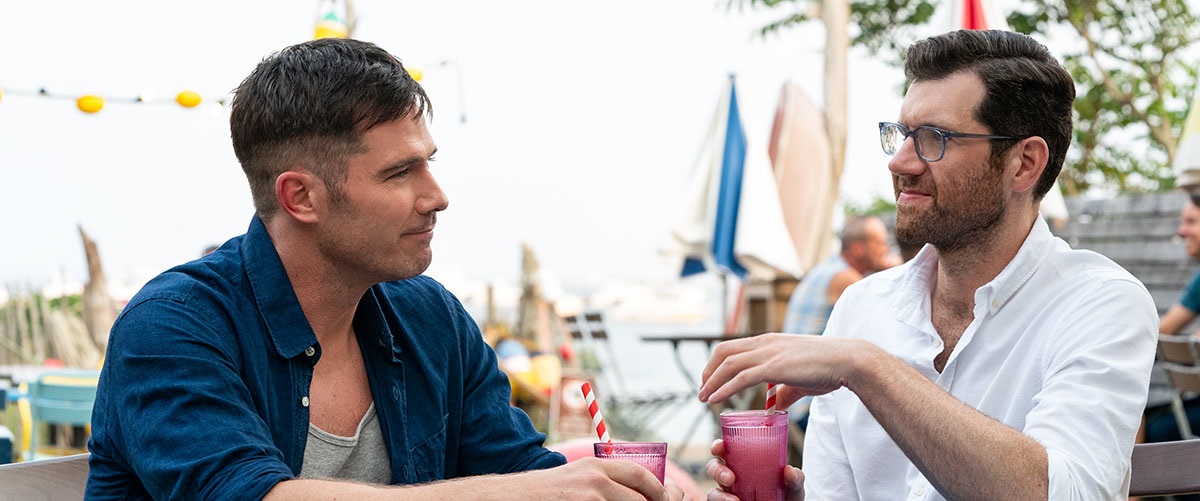
Romantic comedies, especially ones as funny as Bros, don’t generally offer “teachable moments” for the audience, but this one did.
Here’s the setup:
Our hero, Bobby (Billy Eichner), is meeting the parents of his new boyfriend, Aaron (Luke Macfarlane). Aaron is a former jock from Upstate New York—the Midwest of New York, if you will—not quite closeted, but hardly loud and proud. Bobby, on the other hand, is a born and raised New Yorker who has always leaned into his gayness, even before the rest of the world had caught up to him.
Aaron warns Bobby that his parents are conservative, and he should be “chill” and “tone it down.” Bobby agrees that he will. He gives Aaron’s parents a tour of New York, which is his New York—gay New York. Aaron isn’t thrilled about it and expresses his displeasure to Bobby, which causes Bobby to go all in. At dinner—he has taken Aaron’s family to restaurant where waiters exuberantly belt out show tunes—he argues with Aaron’s mother, a second-grade teacher. She thinks her students are too young to be taught about gay history. He maintains it’s the perfect time. They agree to disagree, much to Aaron’s relief. But Bobby can’t help himself. He continues to argue with Aaron’s parents, and then blurts out that their own son wouldn’t be so repressed if they had nurtured and supported his gayness when he was a child the way his parents did.
Aaron is furious. And understandably so. Bobby clearly crossed a line. But later, when Aaron confronts Bobby, it’s Bobby who demands an apology. Yes, he admits, he may have gone too far. But he did it on purpose. We all know what “tone it down” means, he says. Be less gay. Be less myself. Why on earth should anyone ever ask him to hide his light under a bushel, especially someone who allegedly loves him? Why should he ever have to be anything other than fully, completely himself?
The journey of Bobby mirrors the journey of Eichner, who did, in fact, have very supportive parents who took him to Broadway shows and believed he could be the next Tom Hanks. And because of that, Eichner believed it, too. It wasn’t until he got into the biz that he had doors slammed in his face—he was too gay for Hollywood; he could play best friend roles but never be the leading man. So Eichner forged his own path, first creating the iconic Billy on the Street comedy show and now, starring in and writing one of the first mainstream gay rom-coms, a film that pays homage to the New York movies he so treasured growing up: When Harry Met Sally, Annie Hall, Moonstruck, You’ve Got Mail. (By the way, I learned a lot about Eichner by listening to his interview on the wonderful Talk Easy podcast, which I highly recommend.)
Eichner, who has expressed annoyance with the fact that straight actors so often play tortured gay characters—see Brokeback Mountain, Milk, Dallas Buyers’ Club, et al—populated his film with an entirely gay cast, including the straight parts. He also made the film very gay—not polite gay to avoid threatening straight people, a la Queer Eye For the Straight Guy. There are rough (albeit funny) sex scenes, there are Grindr hookups, there’s talk of tops and bottoms and dick pics, and so on.
I want to be clear about something—Bros is radical in its own way and a cultural breakthrough. It’s also just a damn good rom-com.
Eichner’s Bobby is a podcast host and the chair of a soon-to-open museum of LGBTQ+ history. He has convinced himself that he values his independence and isn’t looking for love. Then along comes Aaron, whom he meets a club. At first, he thinks Aaron, with his baseball cap, fondness for Garth Brooks, and artificially enhanced physique would never go for him, that he only likes fellow “bro-y” types—other guys who are quick to remove their shirts at clubs and go to the gym like it’s their job. But Aaron does like him—he’s stimulated by Bobby and awed by his self-possession. Bros is about how these two men who have studiously avoided intimacy discover that intimacy is actually good.
Like all good rom-coms, there are obstacles along the way: The aforementioned fight. The fact that Bobby is totally stubborn and Aaron can’t quite let go of hook-up culture. The insecurities they both have—Aaron that he’s not evolved enough for Bobby; Bobby that he’s not hot enough for Aaron. But we root for them to get over their hang-ups and be together. We can see they’re meant for each other.
Knowing Eichner’s influences, it’s no surprise that the film ends with Aaron running through the streets of New York to meet Bobby at the opening of his museum. Earlier in the film, Bobby had bristled at the idea that love is love is love. Gay love is different, he argues. It’s specific. It has its own contours, its own challenges, its own story to tell. But one thing is for sure—gay, straight, bi, trans, nonbinary—everyone loves a happy ending.
